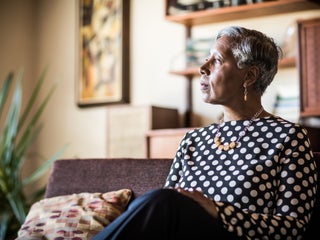Summary
When you’re on a plane, the person demonstrating the safety features always reminds you – in the event of an emergency – to put on your oxygen mask first, then help others. But in our society, women are traditionally reminded to put others first, often at their own expense –…
The content on this page is accurate as of the posting date; however, some of our partner offers may have expired. Please review our list of best credit cards, or use our CardMatch™ tool to find cards matched to your needs.
When you’re on a plane, the person demonstrating the safety features always reminds you – in the event of an emergency – to put on your oxygen mask first, then help others. But in our society, women are traditionally reminded to put others first, often at their own expense – literally.
Women tend to take on much of the invisible work in the home, spending far less on themselves due to shouldering the cost of caregiving as well.
Although it’s expected for women to prioritize their families over themselves, perhaps it’s time to strike a balance and take back control of your finances – and even treat yourself first.
The impact caregiving can have on your finances
Caregiving can compound other financial issues
Jordanne Wells, founder of the website Wise Money Women, said the problem with women being caregivers is that it compounds many of the other financial issues they face that negatively impact their financial health: women earn less money on average, invest less money and shoulder more student debt.
As caregivers, all these become magnified, causing many female caregivers to be especially vulnerable to financial struggles.
On average, women already earn less than men, but when coupled with being a caregiver, it can result in even lower income levels. Many caregivers gravitate toward positions that allow for flexible work hours or have low demands or not “mission-critical” work where they can take time off as needed to prioritize caregiving, Wells said.
Someone needs to be able to take children or parents to the doctor, the dentist, physical therapy or social outings. And that, Wells noted, requires the ability to take time off work. As a result, caregivers are more likely to have part-time positions or ones that are flexible, which means they can end up with lower-earning-potential jobs.
Taking care of people goes beyond having a flexible schedule, Wells pointed out. It also requires a financial investment.
Activities to improve physical, emotional and mental health; supplies; medical costs – they can drain your finances quickly.
“I had a friend who was caring for her mother, and she would tell me that she wasn’t able to save much of her money because it was costly to ensure her mother was still being social,” Wells said.
See related: Women and financial anxiety: How fear impacts financial independence
Ripple effects
Having fewer funds available makes it less likely for many caregivers to adequately meet all financial obligations and financial goals, Wells explained.
So investing and emergency funds can be left behind in an attempt to just meet everyday needs for survival.
And unpaid caregiving contributes to women having greater financial difficulties, especially in retirement, said Dr. Mary Gresham, an Atlanta-based psychologist who specializes in relationship, work and career issues.
Working part-time or not working has a lasting impact. With lower Social Security contributions and losing the opportunity to receive matched 401(k) contributions, caregivers could feel the financial impact for years after they end their role as a caregiver.
Because of this, female caregivers often have fewer benefits and lower retirement savings. Yet women live longer than men. This contributes to higher rates of poverty for elderly women, Gresham pointed out. Even more troubling: the U.S. has no real safety net.
Antiquated expectations
A 2019 PWC employee wellness survey found that “nearly half of employees with adult children are willing to sacrifice their own financial well-being for their kids.”
And among employees providing financial support for parents, that number is even higher. Sixty percent say they’ll need to take money from their retirement plans, which supports the theory that caregivers are willing to take one for the team to ensure the welfare of those they care for.
“I believe this has to do with nurture and traditional gender roles,” Wells said. “As much as we hate to admit it, many women have been traditionally raised to be caregivers.”
Even while we hear that we can do anything, or that we can be anything we want, we’re still given baby dolls and taught to take care of others. And those ideologies ingrained in our brains are hard to fight, Wells emphasized.
So when siblings leave the brunt of the caregiving on the sisters, she explained, parents expect daughters to take care of them.
Women feel trained and obligated to do it because caregiving is part of the responsibilities of “good daughters.”
Gender roles are changing
Throughout history and within traditional partnerships, the woman has been the caregiver and emotional bedrock upon which the family is anchored, while the man has been the financial brawn with seemingly little else to offer the family, said Debra L. Kaplan, psychotherapist and author of the book, “For Love and Money: Exploring Sexual & Financial Betrayal in Relationships.”
These implicit or explicitly defined roles were allocated to inside the home vs. outside of the house.
Clearly, this description is reductive by modern standards. It’s also understandably offensive to most individuals who do not adhere to – nor would wish to be reduced to – such narrow identity or ability, she added.
But Kaplan noted that historical division of roles for men and women has changed.
Today, the workforce looks much more diverse, and many men are choosing to stay home and care for children. Yet the ways in which people have been financially compensated has not kept pace with this change.
It is natural for a male to demand fair compensation, ask for a raise and believe that he is entitled to do so. It is their economic birthright, Kaplan said.
See related: Closing the gender pay gap
But it’s also a woman’s need to demand, ask for and feel entitled to her economic rights, she noted.
As a therapist, Kaplan helps individuals and couples identify and understand their relational currency, what they need or value in the relationship and what they bring to the table. And she said women in particular have a difficult time owning their power and self-worth.
In that regard, women can suffer financially. And while they believe that they “put themselves first,” they might be depleting themselves without valuing their needs at all, Kaplan said.
“Financial health is an extension of self-worth – on par with caring about others and not forsaking self,” she explained.
What you can do
If you need – or want – to be a caregiver for a family member, these steps can help you set boundaries to protect your finances and help you prepare for your own future.
Set up separate accounts
If you are going to be a stay-at-home caregiver for your children, be sure to talk with your partner about setting up a spousal IRA and a separate savings account for you in case something happens to your partner, Gresham suggested.
And make sure your partner carries an adequate amount of life insurance, she advised.
“It is important for you and your partner to talk openly about the value of home-based child care and to understand that you are taking a financial risk by doing so,” she said. “Be sure that you keep up in your job field and have in mind a path to re-employment when it is time to return to work.”
See related: Why women need their own credit
Ask for help with caregiving expenses
Gresham also said that if you are providing unpaid caregiving for elderly parents, be sure to speak with your siblings and ask them to pitch in to pay for things for your parents.
If you have a spouse, be sure you have their support if you are cutting back on your own earnings to care for parents, she added
“These conversations are very hard because money is a hard topic, and women are afraid of being judged negatively if they bring it up,” Gresham said.
Unpaid and unacknowledged caregiving is a blind spot for many. It is a tremendously valuable act of service to the family and the community when we care for those who are dependent – and it should be treated as such.
Securing your own finances is a part of taking care of others
Many women see putting themselves first as being selfish, Wells said. But you can’t provide financial help if you aren’t in a position to do so – you must put yourself first to even be able to help others.
The best way to be a caregiver and maintain your financial health is to plan with caregiving in mind, Wells advised.
Wells noted that she and her sister are their parents’ retirement plan and that they’ve all had the conversation to ensure they are accounted for.
“We talk openly about finances, savings and what our parents would like us to do when they become older and need more everyday help,” Wells said.
The sooner you have the conversation, the better you can plan and make adjustments as needed.
See related: Creating a budget can help you cope with financial stress
Editorial Disclaimer
The editorial content on this page is based solely on the objective assessment of our writers and is not driven by advertising dollars. It has not been provided or commissioned by the credit card issuers. However, we may receive compensation when you click on links to products from our partners.



